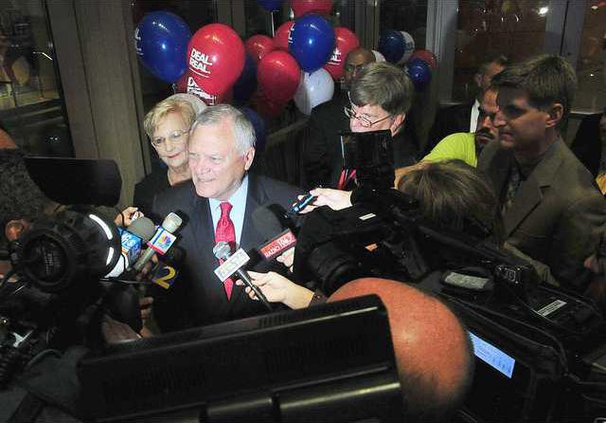ATLANTA — There will be no additional campaign for Nathan Deal, no runoff in December, no more long days on the trail stumping for votes.
The Gainesville Republican saw to that with a clear victory Tuesday in his re-election bid.
Deal will serve a second term after overcoming a challenge from Democrat Jason Carter, a state senator from Atlanta and grandson of former President Jimmy Carter.
Democrats had seen an opportunity for growth in this Republican stronghold with increases in the state’s black population, historically a reliably Democratic bloc. But Republicans were confident their base and swing voters would turn out for the sitting governor, who regularly touted the state’s No. 1 rating by business publications and his administration’s criminal justice work.
Deal earned 78 percent of the votes in Hall County.
Jim Butterworth, Georgia National Guard adjutant general, said agency heads and the team built by Deal during his administration have “built a level of class and ethics that the governor has come to expect.
“And we look forward to continuing that work ... and to work diligently for the people of Georgia.”
The incumbent was part of a Republican takeover of the state’s constitutional offices in 2010. But Deal’s relentlessly optimistic take on the state’s economy proved effective, and Carter didn’t make the impact he needed by focusing on the state’s high unemployment rate and cuts to education.
Unofficial tallies showed Deal winning more than 55 percent of the vote Tuesday with roughly 94 percent of the expected vote counted.
Libertarian Andrew Hunt, the former CEO of an Atlanta nanotechnology firm, also was on Tuesday’s ballot but polled around 2 percent, not enough to swing the race to a runoff.
His next term will be devoted to bettering Georgia, Deal told supporters gathered Tuesday night at the College Football Hall of Fame in downtown Atlanta between chants of “four more years.”
“We’re going to continue to make Georgia the best place in the country for everything you can imagine,” Deal said. “Jobs, environment, family life, best place to live. We have it all going for us and we’re going to keep it moving in that direction.”
The tight race largely focused on the economy and education, and the attacks between Carter, a 39-year-old state senator from metro Atlanta, and Deal, a 72-year-old former congressman elected to the governor’s office in 2010, grew increasingly personal each time the candidates crossed paths in televised debates and other appearances.
Deal painted Carter as a young, inexperienced politician who was promising more than he could deliver without raising taxes. Carter, meanwhile, focused on Deal’s record on education funding and a variety of ethical questions that arose during the incumbent’s first term and faulted Deal for the state’s unemployment rate ranked highest in the nation by federal officials.
Deal easily overcame two primary challengers in the spring and told voters that his administration had done its best post-Great Recession and promised even better results with another four years.
Carter announced his plans to run last November, and quickly proved to be an effective fundraiser and campaigner with help from his grandfather. But a focus on the state’s high unemployment rate and ethical complaints against Deal wasn’t enough for Carter to defeat the incumbent.
Carter told supporters gathered at an Atlanta hotel that he promised to help Deal make the state a powerhouse, and called his grandparents Jimmy and Rosalynn Carter standing by him onstage “shining examples of integrity and honesty and service.”
“Don’t be discouraged out there in any way,” Carter said. “I certainly am not. We’ve accomplished something real. Our state is a better place.”
The campaign, which Deal said would be his last, also was his toughest. Voters were bombarded by about $20 million in advertising focused solely on the governor’s race according to the Center for Public Integrity, and Deal raised more than $15 million to Carter’s $8 million. The incumbent still found himself on defense, and told voters that Carter would increase state spending with no detailed plans for how to find the additional money.
More personally, the Georgia Republican Party lost a staffer in mid-October when 25-year-old Mack Burgess died in a car crash. Deal devoted his win to Burgess’ memory, choking up in the most emotional moment of his victory speech.
“Mack, we won, it’s finished,” Deal said, looking up. “May you rest in peace.”
In his second term, Deal has promised a top-to-bottom review of the state’s education system, including the formula that recommends how much legislators should send to schools, and a continued focus on bringing jobs to the state.
Staff reporter Jeff Gill contributed to this story.

